
In 1938, Katherine Hepburn was one of Hollywood’s biggest stars. She had already won the Academy Award for Best Actress in 1934, and was widely acclaimed as one of the finest actors of her generation.
But at just 31 years of age, she had also been labelled ‘box office poison’.
In print.
On May 3, 1938, the Independent Theatre Owners Association took out a full-page advertisement in ‘The Hollywood Reporter‘ newspaper, calling stars including Hepburn, Marlene Dietrich, Mae West and Greta Garbo as ‘box office poison’, asserting that while the dramatic ability of these stars was “unquestioned”, their box office draw was “nil”. The ad said major studios were burdened with stars whose public appeal was negligible were “taking millions out of the industry and millions out of the box office”, and called for “sound judgement and good business sense” from Hollywood producers going forward.
The theatre owners had reason to gripe, as many of the stars mentioned had given critically acclaimed but commercially unsuccessful flops in the years preceding the advertisement. Hepburn herself had turned in a series of excellent performances but had suffered a string of flops that appears to have begun with ‘Break of Hearts‘ in 1935.
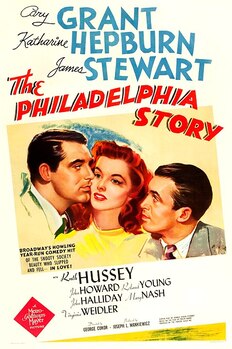
Movies, however, are a collaborative effort and Hepburn was not prepared to take this effort by the theatre owners to single her out for the failure of her films lying down. Hepburn arranged for Philip Barry, a playwright and close friend, to write the play ‘The Philadelphia Story‘, about a socialite whose wedding plans to a wealthy man are complicated by the arrival of her ex-husband and an attractive journalist. Hepburn played the lead role in the play, and it was a smashing success across America, making over $1 million dollars in box-office sales.
Hepburn’s then lover, industrialist Howard Hughes, purchased the film rights to the play and gifted it to the actress. Hepburn, in turn, convinced MGM studios to buy the rights from her for $250,000 in return for Hepburn having veto over producer, director, screenwriter, and cast. The resultant film, ‘The Philadelphia Story’ (1940), starring Cary Grant and Jimmy Stewart along with Hepburn, was a major box-office success and helped re-establish Hepburn as an A-list actress.
After being sidelined by major Hollywood players, the fiercely independent Hepburn had orchestrated her own comeback.
In the upcoming football season, some managers who tasted success in the past have taken on new challenges, in the hope of rekindling the promise they once showed and to prove sceptics wrong. All of them are making comebacks to management following intervals that vary in duration. Some have been on self-imposed exile, waiting for the right offer to come along. Others seem to have been cast out, relegated to the bench despite a solid track record with remarkable results.
Either way, they were waiting. Not anymore.
RAFAEL BENITEZ
(Club: Celta Vigo; Age 63)
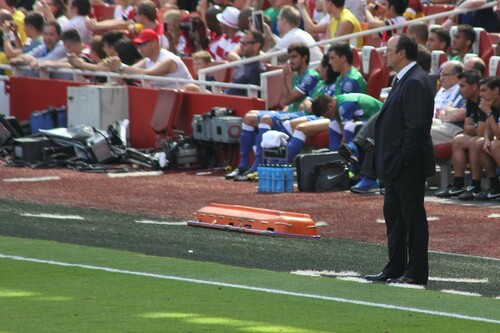
In January 2002, six months into his job as coach of Valencia, a 41-year-old Rafael Benitez gathered some of his most important players around him: Santiago Canizares, Roberto Ayala, Manuel Pellegrino and Pablo Aimar. “I said to them: ‘We will be champions’…. They thought I was crazy,” recalled Benitez in an interview with Radio Valencia Cadena SER and Diario AS.
“But I was convinced, because I knew how we worked and I knew how Real Madrid did it. They were based more on quality, because they had a lot. On the other hand, we were based on the organisation of the group, on being balanced, running a lot, with everyone defending and attacking, and we did it well,” Benitez said.
He was proven right. The Madrid-born Benitez led Valencia that summer to their first Spanish La Liga title in 31 years, defeating the original ‘Galacticos’ of Zinedine Zidane, Luis Figo and Raul Gonzalez. Two years later, Benitez did it again.
For someone who has won 11 major trophies across his managerial career, including the UEFA Champions League, the UEFA Cup and Europa League and the Spanish La Liga, Benitez gets consistently overlooked whenever there is a debate about the greatest coaches of his generation. Jose Mourinho and Pep Guardiola are usually among the first names to be mentioned, followed closely by Carlo Ancelotti and Jurgen Klopp. Diego Simeone and Didier Deschamps, too, deservedly make the list. But Benitez is often forgotten.
The 63-year-old has won silverware at every major club he has been in charge of – the only exception being Real Madrid, where he was in the saddle for just 6 months before being sacked. While his teams have seldom been the prettiest to watch, Benitez has almost always delivered what has been asked of him by his employers – often doing so on a tight budget and while swimming against the tide.
(His one glaring failure, his spell at Everton, was down to larger issues related to recruitment, which was proven by the Toffees’ continuing struggles even after his dismissal).
When managerial vacancies occur nowadays at Europe’s biggest clubs, Benitez’s name no longer figures prominently. This could well end up benefiting Celta Vigo, who limped to safety last season after winning only 2 of their last 12 La Liga matches. Though they eventually finished in 13th place, Celta fired their manager, Carlos Carvalhal, at the end of the season.
The 2023/24 campaign will be Celta’s centenary season, and in signing the experienced Benitez, they may have got themselves a coup.
MARCELINO GARCIA TORAL
(Club: Olympique de Marseille; Age:57)
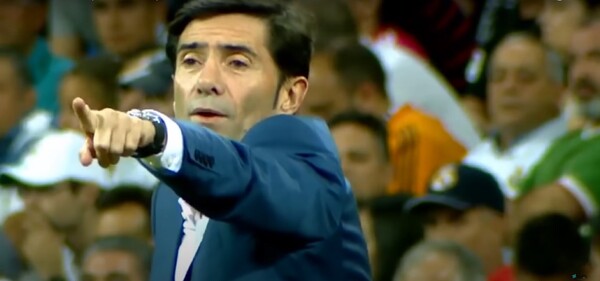
Marcelino will have just turned 58 years old when the Ligue 1 season begins in August later this year. The 2023/24 season will mark Marcelino’s 27th year in management, and his first outside Spain. The Asturian-born coach could have begun his first stint away from Spain much earlier, but he reportedly turned down 4 Premier League clubs last season as he did not want to take over a team mid-way through the season. After having been named Marseille coach well in advance of the new season, Marcelino will get his wish of having a proper pre-season with his new team.
Marseille’s players will need it because they spent the last season under Croatian coach Igor Tudor playing a 3-4-2-1 formation, while Marcelino usually swears by a traditional 4-4-2 or a 4-4-2 with a double pivot. His teams usually employ rapid counter-attacks and high pressing, for which the Spaniard insists his players be at peak fitness at all times.
Marcelino arrives at the Stade Velodrome with trophy-winning pedigree, having led Athletic Bilbao to their first piece of silverware in 37 years by winning the Spanish Super Cup in 2021. He also helped Valencia win the Copa del Rey in 2019. Marcelino led Villarreal to European qualification in all of his 3 full seasons in charge – including Champions League qualification in 2015-16 – and guided Valencia to Champions League qualification in both his seasons in the Mestalla dugout. Since his shock dismissal from Valencia in 2019, the Spanish giants have not qualified for Europe.
Following Spain’s elimination from the Qatar World Cup in the Round of 16, Marcelino had been the favourite to succeed Luis Enrique in the hot seat. Media reports said Marcelino had been given assurances by the Spanish football federation to this effect, but he was overlooked and Luis de la Fuente was appointed as the coach of La Roja.
It was only in January this year that Marcelino lamented the unwillingness of big clubs to take a chance on him.
“I am convinced that they are not going to call me,” he said. “We are a coaching staff that does not meet their conditions. The coaches they choose are usually very successful or former players. They look more for this second profile.”
Marcelino enjoyed a modest playing career as an attacking midfielder before retiring at the age of 28 due to injury, but he now has his chance. Marseille do not have the riches of Paris Saint-Germain, but are the best supported club in France and the only one from the country to have won the UEFA Champions League. They have also not won a trophy in 11 years. With Marcelino at the helm, they look set to challenge PSG domestically and thrill Europe with a deep run in continental competitions.
GERARDO SEOANE
(Club: Borussia Monchengladbach; Age: 44; Nationality: Swiss)
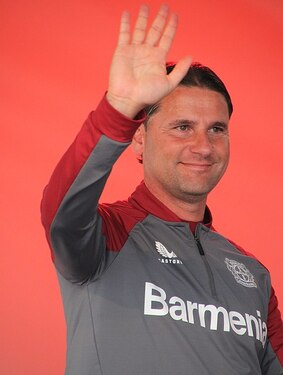
For 4 years between 2018 and 2022, Gerardo Seoane had a touch of Midas about him. He first won 3 successive league titles with the Swiss club BSC Young Boys. This included helping Young Boys win only the second league and cup double in their history during the 2018-19 season. In the same season, he also led them to their first ever appearance in the UEFA Champions League Group Stages. In May 2021, Seoane was appointed manager of Bundesliga club Bayer Leverkusen. The former defender promptly guided Leverkusen to a third place finish in the Bundesliga – Leverkusen’s best finish in 6 years.
A team comprising German wunderkind Florian Wirtz, Czech striker Patrik Schick and French winger Moussa Diaby, among others, scored an exceptional 80 goals in their Bundesliga campaign, next only to usual suspects Bayern Munich and Borussia Dortmund.
“Leverkusen are well on the way to closing the distance to Bayern and BVB,” Seoane told German tabloid Bild in March 2022. “We know that both are still ahead of us, and that these clubs can be a big challenge for any player. But I feel we are in a positive development phase.”
Less than 6 months later, however, Seoane had been fired.
The Swiss had paid the price for a calamitous start to the new season that saw Leverkusen lose 8 of their first 12 matches across all competitions, leaving the club in the relegation zone.
Seoane, who spent six years coaching in the youth sector before taking up his first job in management with Luzern in 2018, took his time before taking on his next job.
He finally returned to the Bundesliga earlier this month, succeeding Daniel Farke at Borussia Monchengladbach.
The son of Spanish immigrants, Seoane speaks 6 languages: German, Spanish, French, English, Italian and Portuguese.
“He’s a young coach, but one with lots of experience. He plays the style of football we want to see here,” said Roland Virkus, Gladbach’s managing director for sport, at the time of Seoane’s appointment.
Gladbach have not won a trophy in 28 years and have finished in the top 4 of the Bundesliga only 3 times in the last 10 years. Under Seoane, Gladbach fans can strap themselves in for an exhilarating ride in the coming years.
MARCELO BIELSA
(Country: Uruguay; Age: 67; Nationality: Argentine)
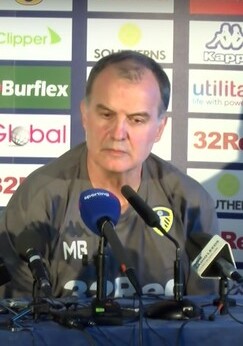
Bielsa’s appointment last month as the new coach of Uruguay ended 14 months of self-imposed isolation from management, since he was fired by English Premier League club Leeds United in February 2022. The 14-month interval was about the same amount of time that lapsed between Oscar Tabarez’s departure as Uruguay coach and Bielsa’s arrival as the new gaffer. It seems as if after 15 years of being under the control of one managerial maven, Uruguay have now entrusted their prospects in the hands of another.
Bielsa’s reputation as someone who likes to work with and nurture youth is well-earned. True to form, in his first Uruguay squad, Bielsa called up 7 members of the victorious Uruguay Under-20 squad that lifted the FIFA Under-20 World Cup in Argentina earlier this month.
After taking up the Uruguay job, Bielsa said one of the main reasons he had accepted the post was that, “No club would have been able to offer me a group of players like those that Uruguay have right now.”
While the generation of Luis Suarez, Edinson Cavani and Diego Godin is on its way out, new stars such as Federico Valverde, Darwin Nunez and Ronald Araujo headline the next generation of Celeste stars.
Uruguay under Tabarez finished in fourth place at the 2010 FIFA World Cup and won the 2011 Copa America championship. Subsequent years saw them struggle to match these successes however, and a Group Stage exit at the 2022 World Cup – their earliest elimination in 20 years – marked a particular low point for the Celeste.
The last national side Bielsa coached was Chile, who he helped qualify for the 2010 FIFA World Cup, their first since 1998.
“The great virtue and merit of having qualified for the (2010) World Cup is only his,” Chile defender Maurico Isla once said about the legendary manager’s impact on the national team.
“We players know we are the ones who play but he revolutionised the country,” Isla said. “He built a team with very young players who had got no chance of playing in the senior team.”
Isla, who was given his international debut by Bielsa, was one of the Uruguay players who had been part of the Under-20 team that had finished third in the 2007 FIFA Under-20 World Cup. Another member of the squad was striker Alexis Sanchez, who once said, “It is because of (Bielsa) that I am who I am.”
“What I remember the most about Bielsa was the mentality that he tries his players to have,” Sanchez told Spanish newspaper El Mundo.
Along with his obsessive attention to detail, Bielsa will also bring with him to Uruguay a reputation for fair play – something that may grate some Celeste players who excel at gamesmanship. Transforming his employers’ reputations is something of a Bielsa specialty though – he helped Leeds United, famously called ‘Dirty Leeds’ for their style of play under Don Revie in the 1960s, become one of the most popular teams in England with a gung-ho attacking style and a scrupulously honest approach to the game.
He might yet do the same for Uruguay.

